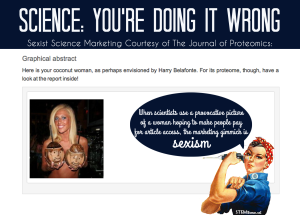Last week, I co-hosted a panel discussion by STEM Women on Everyday Sexism in Academia. Our guests were Professor Rajini Rao PhD in Biochemistry who runs her own lab at Johns Hopkins University USA, and Dr Tommy Leung, Evolutionary Biologist with the University of New England, Australia. The video covers five scenarios that arise in early career academic life: sexist comments that undermine women’s confidence; sexism in publishing; “tone policing” how women speak; a mentor who inappropriately asks a junior researcher on a date; and the way in which women scientists are spoken about in stereotypically gendered ways. For example, women are described as mothers and wives first, and scientists second, while men are just “scientists.” In this post I cover the highlights of our discussion. First, I provide an overview of the sociological definitions of sexism, and how everyday experiences of sexism feed into broader patterns of sexual harassment and gender discrimination.

I recently wrote up an overview of the sociological and legal definitions of sexism. Sexism describes the ideology that one gender is superior to another. To put it another way, it’s a system of attitudes, beliefs, stereotypes, and other types of bias that perpetuate the idea that women are somehow lesser than men. These attitudes may or may not be voiced overtly, but they nevertheless guide social interaction and behaviour.
The word “sexism” has taken on a life of its own in the public imagination, when people joke about what it is, even suggesting that there’s such a thing as “reverse sexism” (there isn’t), typically when denouncing affirmative action or gender quotas at work. The scientific meaning of sexism is lost when people argue about what sexism is or isn’t. Many people think sexism is subjective. That’s incorrect.
There are different terms floating around that often confuse people. For example, hostile sexism is the type of overt physical and verbal aggression people often think about when they think of “sexism.” Benevolent sexism includes inappropriate “compliments” that focus on a woman’s looks, which inadvertently reproduce the idea that women should be judged primarily on their physical appearance and sexuality.
“Unintentional” or “accidental” sexism encompasses the “jokes,” comments and behaviour that people put down to ignorance. This includes everything from putting up pictures of semi-naked women at work, “overlooking” women on meeting invites or other career opportunities, and “casual remarks” and “oversights” like speaking about professionals, such as engineers, using the pronoun “he.”
In the STEM Women article, I show that these various terms and the attitudes and behaviours described by hostile, benevolent and unintentional sexism are all the same: they are all examples of sexism. The fact that one person might view one example as more extreme than another has no bearing on the impact these attitudes and behaviours have on women. Their cumulative effect is that women are denigrated, undervalued and expected to “put up” with sexism.
The sociological concept of everyday sexism captures the idea that everyday social exchanges, whether they’re “benevolently,” “unintentionally” or “accidentally” sexist, are actually connected to broader issues in sexist culture, such as sexual harassment and institutional discrimination. Sexism is more than the things that we say and do: it’s about the prejudices that underpin sexist culture. It’s about all the individual and collective things we do and say that makes possible sexual harassment and discrimination.
In our STEM Women panel discussion (the video above), we talked about the sociological definition of everyday sexism, which demonstrates how everyday social exchanges between individuals are connected to institutional discrimination. Specifically, how conversations between academic colleagues that are sometimes called “benevolent” or “unintentional” sexism, are actually the outcome of systemic issues of gender inequality. This includes “jokes” that play on a woman’s gender and sexuality (“You’re a cheap date”); complimenting a woman on her looks and propositioning a junior colleague at a conference; and critiquing a woman scientist for the way she speaks, such as saying she’s “too aggressive” in negotiations or “not nice enough” when addressing sexism (this is often known as “tone policing”).

We also covered the recent case where the Journal of Proteomics published a photo of a bare chested woman in an abstract to promote a scientific paper, which STEM Women critiqued. Finally we discussed how, even in professional contexts, people often discuss women scientists as mothers and wives first, rather than focusing on their professional achievements. For example in The New York Times obituary of rocket scientist Yvonne Brill.
Everyday sexism shows that women’s gender is a both a barrier to professional recognition, as well as a heavily policed focal point of scrutiny.
People think these seemingly innocuous examples of sexism are subjective – that women should just take a joke and not be “so sensitive.” We showed how social science actually connects these everyday comments to the professional barriers that women face in their scientific careers. This includes women’s pay, their career progression and professional esteem, their publications, women’s contribution and participation in STEM, and other more overt forms of workplace discrimination and sexual harassment.
Learn more about STEM Women, an initiative led by women scientists, and supporting the careers of women in STEM. Join us on Twitter or Google+.
Connect With Me
Follow me @OtherSociology or click below!



Terrific summary, thanks for hosting Zuleyka Zevallos . I enjoyed doing this. I hope this helps in discussing gender related STEM issues on G+ 🙂
LikeLike
Thanks very much Rajini Rao Your excellent examples of everyday sexism were nuanced. They illustrated both the subtle and more overt gender problems that women academics face. Both you and Tommy Leung were excellent guests!
LikeLike